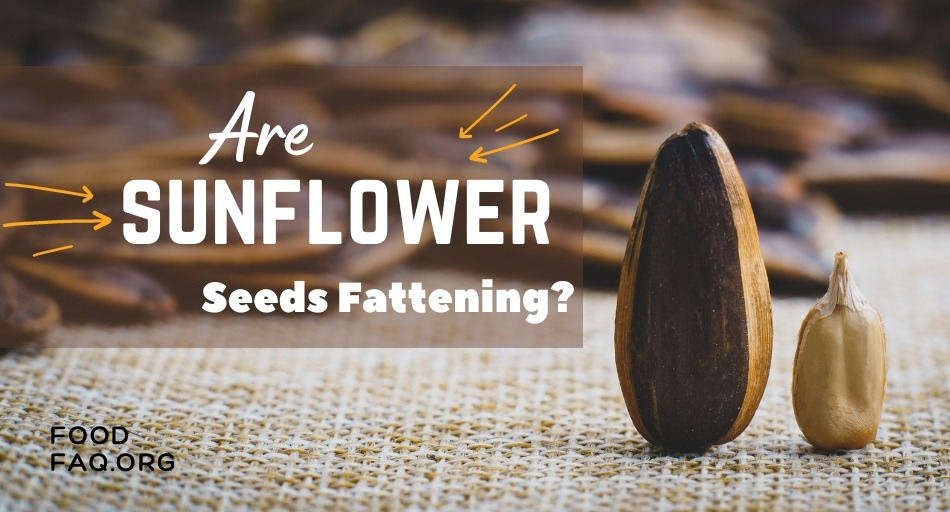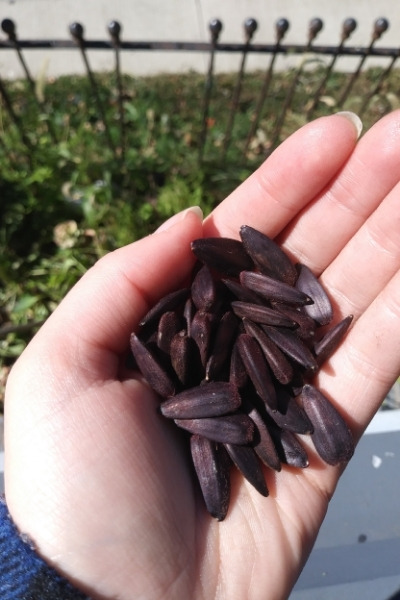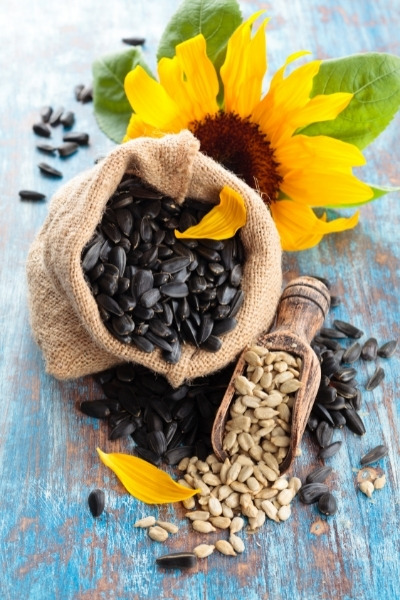Sunflower seeds are a very popular snack food that most of us have tried at least once. Even though they’re commonly consumed as a snack, people also add them to salads, larger meals, and even baked goods.

Just like with most seeds, a large portion of calories found in sunflower seeds comes from fat.
This might make you wonder whether you should add them to your diet if your goal is weight loss. So, are sunflower seeds fattening?
Table of Contents
Are sunflower seeds fattening?
Sunflower seeds contain quite a number of calories, mostly from fats. But, if consumed in moderation, eating them can actually be beneficial for a weight loss diet. This is because these seeds contain a great dose of healthy fats, protein, and micronutrients that all contribute to your health and can help you lose weight in a healthy way.
How many calories are in sunflower seeds?
One ounce of dry-roasted sunflower seeds contains around 163 calories. Just like other seeds and nuts, sunflower seeds contain quite a large number of calories, but they’re actually rather filling.
In fact, this single serving provides you with 12% of your daily recommended need for fiber.
Sunflower seeds also contain healthy fats, which also increase the filling of fullness, lowering the overall number of calories you’re consuming.

A one-ounce serving of oil-roasted sunflower seeds contains 166 calories. It contains similar nutrients as its dry-roasted counterpart.
Unfortunately, oil-roasted sunflower seeds tend to contain trans fat, which has been linked to an increased risk of cardiovascular disease, cancer, and diabetes.
So, whether you’re trying to lose weight or follow a healthy diet, it’s best to stick to dry-roasted sunflower seeds.
Are sunflower seeds good for you?
Aside from being high in several important nutrients, sunflower seeds also pack a great dose of vitamin E. This micronutrient contributes to the health of your skin and eyes.
It also boosts your immune system, strengthening your body’s natural defense mechanism against viruses and infections.
In addition, vitamin E works as a powerful antioxidant, increasing the benefits it has for your body.
Since it’s a fat-soluble vitamin, getting it from foods high in fat – like sunflower seeds – is very beneficial for your health.
Sunflower seeds also contain special compounds that reduce the inflammation in your body.
While short-term inflammation isn’t harmful, chronic inflammation is a risk factor for various chronic issues, including heart disease, type 2 diabetes, and even certain types of cancer.

Eating sunflower seeds has been linked to a lower level of inflammatory markers as compared to the inflammation levels in people who don’t eat sunflower seeds.
So, adding this type of seeds to your diet can prevent these issues from developing.
Some studies also show that eating sunflower seeds can reduce your risk of type 2 diabetes. The fiber found in sunflower seeds helps lower fasting blood sugar levels, reducing the symptoms of diabetes.
What’s more, other bioactive plant compounds in sunflower seeds have a positive effect on how fast carbs affect your blood sugar.
These compounds slow down this process, improving your blood sugar levels.
Sunflower seeds also provide you with 32% of your daily recommended need for phosphorus in a single serving. This mineral, which many people don’t get enough of, helps build strong teeth and bones.
It also manages how your body uses and stores energy from the food you’re consuming.
Phosphorus may even help reduce muscle pain after exercise, which can be beneficial for people working out to lose weight.
Like other seeds, sunflower seeds are a great source of powerful antioxidants, compounds that remove free radicals from your body.

This prevents oxidative stress to your cells, lowering your risk of serious conditions like heart disease, cancer, and diabetes.
Antioxidants also reduce inflammation, neutralize harmful substances in your body, and improve the health of your brain, eyes, and heart.
So, consuming enough antioxidant-rich foods is very important for optimal health.
Should you eat sunflower seeds if you’re trying to lose weight?
Although sunflower seeds are rather caloric, eating them can help you lose weight. Firstly, sunflower seeds contain a great dose of fiber, providing you with 3.1 g of this nutrient in a single one-ounce serving.
Fiber helps you feel full after eating, which curbs your appetite and prevents overeating. A diet high in fiber-rich foods can also improve your digestion, benefiting your weight loss goals even more.
Additionally, sunflower seeds are quite rich in protein. This macronutrient prevents muscle loss when you’re in a caloric deficit, which is important as muscles keep your metabolism strong.
Protein is also much more filling than carbohydrates, increasing the feeling of fullness after eating. So, sunflower seeds are beneficial for weight loss thanks to their high content of protein.
Sunflower seeds also contain essential fatty acids, which, just like protein, are very filling.
The fats found in sunflower seeds are heart-healthy and can prevent various health conditions, including heart disease.
These fatty acids also prevent the development of type 2 diabetes, which increases your risk of weight gain.

So, even though most of the calories in sunflower seeds come from fat, eating them may actually promote weight loss instead of preventing it.
Is sunflower seed butter fattening?
One tablespoon of sunflower seed butter provides you with around 93 calories. Just like other kinds of nut and seed butter, it’s quite caloric, so it should be consumed in moderation by people trying to lose weight.
With that being said, sunflower seed butter contains some good nutrients, including healthy fats, protein, pantothenic acid, and magnesium.
So, having some of this type of butter can be good for your health and satisfy your hunger in-between meals.
Conclusion
Sunflower seeds can be a great addition to any balanced diet, even one made for weight loss. These seeds are loaded with essential nutrients like healthy fats and protein, which help you lose weight in a healthy way.
Sunflower seeds also pack a great dose of several minerals and are easy to add to any diet, no matter what dietary plan you follow.
So, you might want to consider snacking on some sunflower seeds from time to time.
